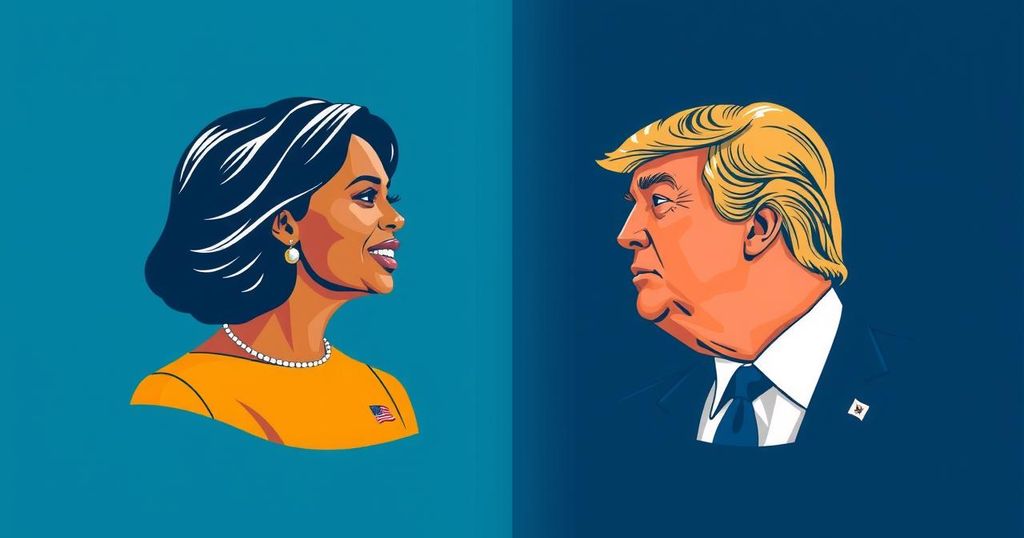Global Leaders’ Preferences in the 2024 U.S. Presidential Election: Harris vs. Trump

As the U.S. presidential election nears, global leaders express differing preferences for candidates regarding foreign policy impacts. Notably, Vladimir Putin seems to favor Trump for perceived pro-Russian policies, while European leaders lean towards Harris for her commitment to NATO and democracy. Israeli Prime Minister Netanyahu appears to prefer Trump, while both Xi Jinping and Narendra Modi maintain a neutral stance. The preferences indicate a broader implication for international relations, reflecting concerns about stability and collaboration across various regions.
As the United States approaches its presidential election on November 5, the global community is closely observing the contest between Democratic Vice President Kamala Harris and Republican former President Donald Trump. Various world leaders appear to have differing preferences in this high-stakes political scenario influenced by American policies affecting international relations. Russian President Vladimir Putin seemingly favors Trump due to perceived lenience towards Russia, viewing Trump as an ally who may uplift sanctions and curtail military support for Ukraine. Timothy Ash, an associate fellow at Chatham House, remarked, “Putin would love Trump as president for various reasons,” highlighting Putin’s disdain for Western democratic norms, which he believes Trump could undermine. Conversely, despite some recent playful comments about Harris by Putin, analysts suggest that Moscow expects an unfavorable stance towards Russia regardless of the victor. In China, President Xi Jinping has not publicly indicated a preference for either candidate. However, scholars suggest that while both candidates present challenges, behind the scenes, Chinese leaders may prefer Harris, as she might maintain a more predictable course of action regarding U.S.-China relations. Israeli Prime Minister Benjamin Netanyahu has not definitively endorsed either candidate but is perceived to lean towards a Trump win, reflecting the strong ties established during Trump’s presidency. His relationship with Biden has become tenuous, given the Biden administration’s unwavering support for Israel amid its conflict with Gaza. In Europe, many leaders express a preference for Harris, citing concerns over Trump’s threats to withdraw from NATO and existing trade practices. German Chancellor Olaf Scholz stated, “I know her well, she would certainly be a good president,” indicating broad support for continuity in U.S. foreign policy towards Europe. Prime Minister Modi of India remains neutral, recognizing the importance of a bipartisan approach to U.S.-India relations wherein both candidates could facilitate ongoing strategic partnerships. South Korean President Yoon Suk Yeol has not explicitly endorsed a candidate but may support continuity under Harris, given the growing military cooperation that has flourished under the Biden administration. Finally, the implications of a Trump victory in Australia raise significant concerns regarding commitments to climate change initiatives and relationships with key trading partners like China. Overall, while world leaders exhibit varying degrees of preference for either candidate based on their perceptions of potential shifts in U.S. foreign policy, the overarching sentiment is the recognition of the importance of the upcoming election in shaping global alliances and international interactions.
The article explores the preferences of various world leaders regarding the upcoming U.S. presidential election. With the contest between Kamala Harris and Donald Trump tightly contested, the global implications of the election outcomes are significant due to the United States’ dominance in international politics. Leaders from nations such as Russia, China, Israel, and European countries are highlighted for their views on how either candidate might affect diplomatic and trade relations. The varying stances reflect considerations such as national security, economic interests, and ideological alignments, indicating that the election is not solely a domestic affair but a global concern.
In conclusion, the preferences of world leaders for the U.S. presidential candidates reveal a complex web of geopolitical interests, with some favoring Trump due to anticipated leniency in policies and relationships, while others, particularly in Europe, indicate a preference for Harris due to her alignment with established diplomatic norms. The outcomes of this election will indeed have far-reaching consequences for global relations, emphasizing the critical nature of the U.S. role on the world stage.
Original Source: www.aljazeera.com








